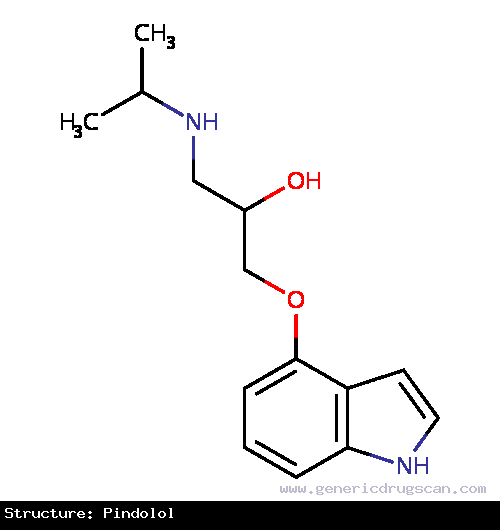Pindolol Drug: Indication, Dosage, Precaution, Side Effect , Storage, Category Type and corresponding Brands - www.genericdrugscan.com
Pindolol
Drug Status in USA : ApprovedDrug Status in Canada : Approved
pronunciation
pronounced as (pin' doe lole)
Why is this medication prescribed?
Pindolol is used to treat high blood pressure. Pindolol is in a class of medications called beta blockers. It works by relaxing blood vessels and slowing heart rate to improve blood flow and decrease blood pressure.
High blood pressure is a common condition and when not treated, can cause damage to the brain, heart, blood vessels, kidneys and other parts of the body. Damage to these organs may cause heart disease, a heart attack, heart failure, stroke, kidney failure, loss of vision, and other problems. In addition to taking medication, making lifestyle changes will also help to control your blood pressure. These changes include eating a diet that is low in fat and salt, maintaining a healthy weight, exercising at least 30 minutes most days, not smoking, and using alcohol in moderation.
How should this medicine be used?
Pindolol comes as a tablet to take by mouth. It usually is taken two times a day. To help you remember to take pindolol, take it around the same time(s) every day. Follow the directions on your prescription label carefully, and ask your doctor or pharmacist to explain any part you do not understand. Take pindolol exactly as directed. Do not take more or less of it or take it more often than prescribed by your doctor.
Pindolol helps control your condition but will not cure it. Continue to take pindolol even if you feel well. Do not stop taking pindolol without talking to your doctor. If you suddenly stop taking pindolol, you may experience serious heart problems such as angina (chest pain) or heart attack.
What are the precautions to be followed?
Before taking pindolol,- tell your doctor and pharmacist if you are allergic to pindolol, other medications, or any of the ingredients in pindolol tablets. Ask your pharmacist for a list of the ingredients.
- tell your doctor and pharmacist what prescription and nonprescription medications, vitamins, nutritional supplements, and herbal products you are taking. Be sure to mention any of the following: medications for heart disease or high blood pressure, reserpine, and thioridazine.
- tell your doctor if you have or have ever had asthma or other lung diseases; diabetes; severe allergies; thyroid problems; or heart, liver, or kidney disease.
- tell your doctor if you are pregnant, plan to become pregnant, or are breastfeeding. If you become pregnant while taking pindolol, call your doctor.
- if you are having surgery, including dental surgery, tell the doctor or dentist that you are taking pindolol.
- you should know that this medication may make you drowsy. Do not drive a car or operate machinery until you know how this medication affects you.
- remember that alcohol can add to the drowsiness caused by this medication.
What are possible side effects of this medication ?
Pindolol may cause side effects. Tell your doctor if any of these symptoms are severe or do not go away:- dizziness or lightheadedness
- excessive tiredness
- difficulty sleeping
- unusual dreams
- upset stomach
- heartburn
- cold hands or feet
- muscle or joint pain
- difficulty breathing
- sore throat and fever
- unusual bleeding
- swelling of the feet or hands
- weight gain
- chest pain
- slow, irregular heartbeat
How to store the medication and dispose it of after its use later?
Keep this medication in the container it came in, tightly closed, and out of reach of children. Store it at room temperature and away from excess heat and moisture (not in the bathroom). Throw away any medication that is outdated or no longer needed. Talk to your pharmacist about the proper disposal of your medication.
Drug Category/Class
- Vasodilator Agents
- Serotonin Antagonists
- Antihypertensive Agents
- Adrenergic beta-Antagonists
- Cardiovascular System
- Beta Blocking Agents
- Beta Blocking Agents, Non-Selective
- CYP2D6 Inducers
- CYP2D6 Inducers (strong)
- Beta blocking agents, non-selective
- Beta blocking agents, non-selective, and other diuretics
| Prescribed | For the management of hypertension, edema, ventricular tachycardias, and atrial fibrillation. |
| Weight : | 248.3208 |
| Structure | Pindolol |
 | |
| Formula | C14H20N2O2 |
Pindolol has 2 Brands listed
| Visken (10 mg) | Visken (15 mg) |
Search Generic Drugs alphabetically
